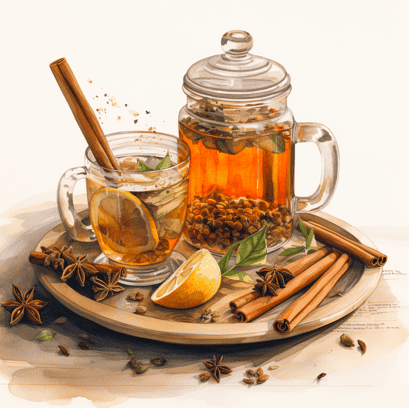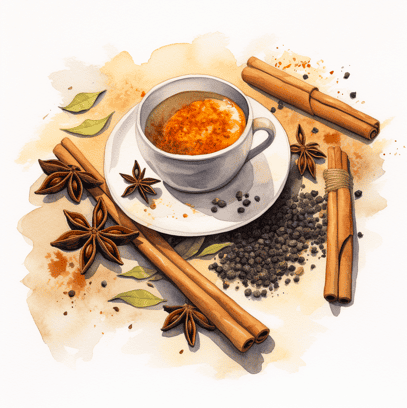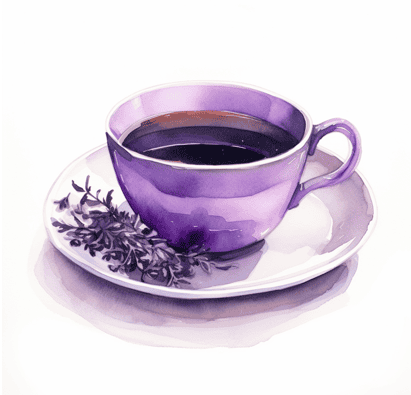
Is there caffeine in chai tea? Many health-conscious folks love the comfort of masala chai, but worry about caffeine’s effects on sleep and skin health. Below, we’ll uncover if your typical cup of chai tea has much caffeine, as well as the kinds of chai with little to no caffeine at all.
Hi, I’m Hazel
I gave up on skincare after years of issues with acne and sensitive skin.
But after going plant-based, my skin cleared up and even started to glow. Now I help women reveal their natural beauty with simple, delicious plant-based food.
I also used to be a nurse, and love nerding out on nutritional science (high-quality science, that is).

As usual, this post is based on the strongest nutritional evidence I could find with a focus on the simplest, most delicious foods
…because who has time to waste on actions that don’t work?
The quick version:
Yes, traditional chai tea contains caffeine because it’s typically made with black tea, which is a caffeinated ingredient. The exact amount of caffeine can vary based on the blend and how the tea is prepared, but generally, a cup of chai tea has less caffeine than a cup of coffee.
The Ingredients of Chai
Chai blends more than just flavour—it’s a rich mix of culture and health.
The base of traditional chai tea often involves black tea leaves, well-known for their natural stimulant properties.

But it’s the blend of spices—like cardamom pods, black peppercorns, and sometimes even star anise—that turns your everyday tea into something extraordinary. Each ingredient not only adds depth to the flavour but also brings its own set of health benefits. This makes chai a popular beverage beyond it’s taste.
Worried about the caffeine levels? Well, they vary.
How Much Caffeine Is Really in Chai?
When it comes to chai, understanding the caffeine content can be a bit of a puzzle as there are several types of tea used as its base.
A typical cup of tea made with black tea leaves—the foundation of most chai tea blends—contains caffeine.
However, the amount can vary.
For instance, a chai tea latte from your favourite coffee shop might have more caffeine than the chai tea bag you steep at home due to differences in tea concentration and brewing time.
We will go through your options next.
Caffeine Levels of Types of Chai
Whether you’re looking for a morning boost or an evening unwind, there’s a chai and a caffeine level for you:
Black Tea Base: Typically contains 40-70 mg of caffeine per cup, offering a robust energy boost. It’s less caffeine than regular coffee.
Green Tea Chai: A lighter option with lower caffeine content than black tea, perfect for those seeking a calming effect.
Rooibos Chai: Herbal teas are your caffeine-free option, ideal for late-night tea times without the buzz.
Chai Concentrate & Herbal Chai Blends: These vary in caffeine content, catering to different caffeine sensitivities.
Chai Latte: Combines the rich, spicy flavours with a moderate caffeine level, suitable for any part of the day.

Health Benefits of Chai
Chai isn’t just a treat for the taste buds; it’s a boost for the body too.
The aromatic spices in chai, like cardamom pods and black peppercorns, are more than just flavourful—they’re packed with antioxidants that nurture your skin, reduces inflammation, stabilise your blood sugar levels, promoting heart health and supporting cognitive function.
In fact spices are the number one food group for antioxidants!

Regularly sipping on chai can help fend off free radicals and support overall wellness, adding a delicious twist to your health regimen. So, while you enjoy that aromatic cup of tea, know that it’s also working to keep you feeling great inside and out.
Is Caffeine-free Chai Healthier than Caffeinated Chai?
Whether chai without caffeine is healthier than caffeinated chai depends on individual health needs and preferences. Here are some points to consider for both options:
Caffeine-Free Chai (e.g., Rooibos Chai)
Pros:
- Better Sleep: Without caffeine, it won’t disrupt sleep patterns, making it a good choice for evening consumption.
- No Caffeine Sensitivity Issues: Ideal for people sensitive to caffeine who might experience jitters, anxiety, or digestive issues from caffeinated beverages.
- Rich in Antioxidants: Rooibos, a common base for caffeine-free chai, is high in antioxidants that can help protect the body against oxidative stress.
Cons:
- Less Energy Boost: Lacks the stimulating effects of caffeine, which can enhance mental alertness and physical energy.
Caffeinated Chai (e.g., Black Tea Chai)

Pros:
- Increased Alertness: Caffeine can improve focus and alertness, making it a good choice for starting the day or for an afternoon pick-me-up.
- Metabolic Boost: Caffeine can increase metabolic rate in the short term, potentially aiding in weight management.
- Potential Health Benefits: Black tea is also rich in antioxidants and has been linked to various health benefits, including improved heart health and reduced cholesterol.
Cons:
- Can Disrupt Sleep: Drinking caffeinated chai in the evening can interfere with sleep quality.
- May Cause Jitters or Anxiety: People who are sensitive to caffeine may experience negative effects.
Is there caffeine in chai?
The healthiness of caffeine-free versus caffeinated chai largely depends on your lifestyle, health conditions, and how your body reacts to caffeine. If caffeine affects your sleep or causes discomfort, caffeine-free chai may be healthier for you. Conversely, if you benefit from the alertness provided by caffeine without any adverse effects, caffeinated chai could be a beneficial part of your diet.
References
Most references below will link to the original peer-reviewed study itself. However, sometimes I will link to a video over at NutritionFacts.org instead, which is by far the single best resource of brutally transparent nutritional evidence you will ever see. Dr Greger tells a great story about the realities of the science and if I think you will benefit more from one of his videos, the link will take you there instead.
Happy nerding!
- Percival SS, Vanden Heuvel JP, Nieves CJ, Montero C, Migliaccio AJ, Meadors J. Bioavailability of herbs and spices in humans as determined by ex vivo inflammatory suppression and DNA strand breaks. J Am Coll Nutr. 2012;31(4):288-294. doi:10.1080/07315724.2012.10720438
- Haldar S, Chia SC, Lee SH, et al. Polyphenol-rich curry made with mixed spices and vegetables benefits glucose homeostasis in Chinese males (Polyspice Study): a dose-response randomized controlled crossover trial. Eur J Nutr. 2019;58(1):301-313. doi:10.1007/s00394-017-1594-9
- Vasanthi HR, Parameswari RP. Indian spices for healthy heart – an overview. Curr Cardiol Rev. 2010;6(4):274-279. doi:10.2174/157340310793566172
- Jiang TA. Health Benefits of Culinary Herbs and Spices. J AOAC Int. 2019;102(2):395-411. doi:10.5740/jaoacint.18-0418
- Carlsen MH, Halvorsen BL, Holte K, et al. The total antioxidant content of more than 3100 foods, beverages, spices, herbs and supplements used worldwide. Nutr J. 2010;9:3. Published 2010 Jan 22. doi:10.1186/1475-2891-9-3